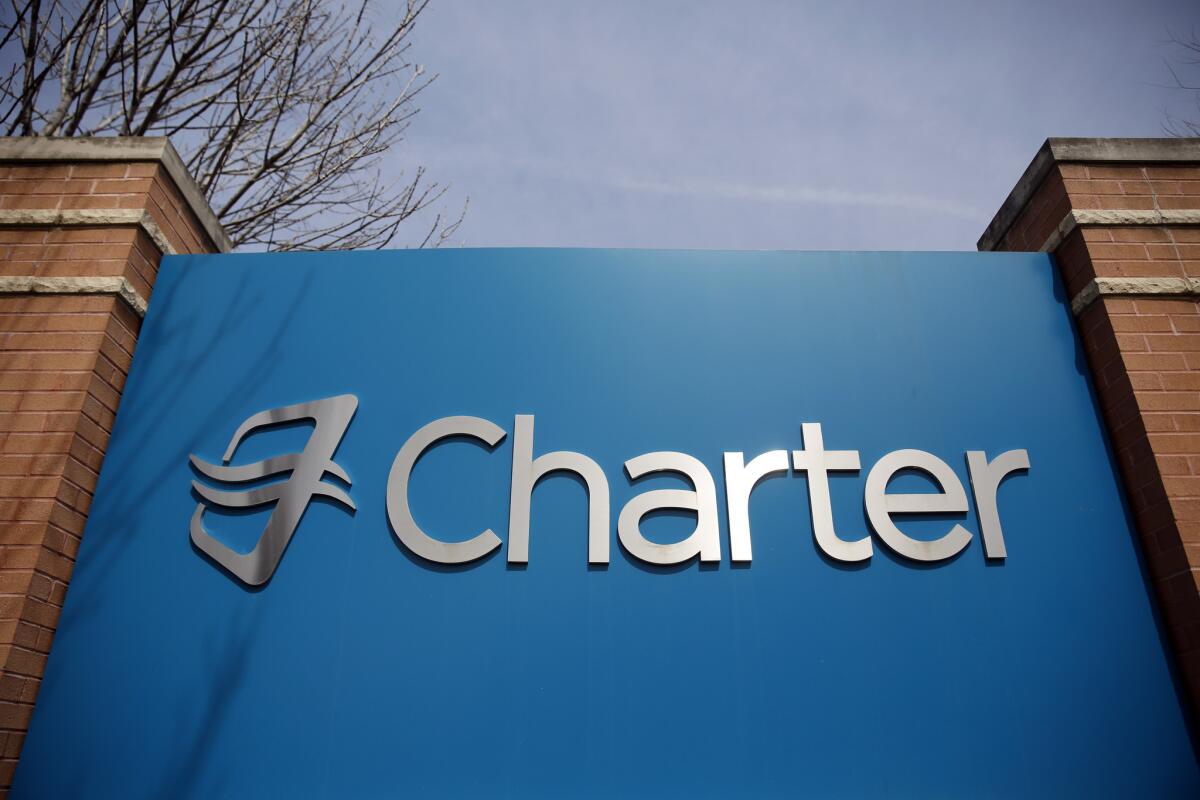California judge recommends approval of Charter-Time Warner Cable deal

Signage at an entrance to Charter Communications’ headquarters in Town and Country, Mo.
- Share via
Charter Communications’ blockbuster deal to acquire Time Warner Cable and Bright House Networks cleared a major hurdle Tuesday when a California administrative judge recommended approval of the deal.
Administrative Law Judge Karl Bemesderfer, in a 74-page opinion, recommended that the California Public Utilities Commission approve Charter’s takeover plans, but he attached a long list of conditions designed to ensure that the cable consolidation carries benefits to the public.
The proposed $67-billion plan would make Charter the dominant pay-TV and Internet service provider in Southern California with more than 2 million customer homes.
The deal is still waiting for approval from the Federal Communications Commission and the U.S. Department of Justice. Those decisions are expected any day.
The Public Utilities Commission is tentatively scheduled to vote on the matter May 12.
Bemesderfer said the cable merger would bring several advantages to customers in California, including faster Internet speeds and more wireless hot-spots. However, he acknowledged that Charter would become the only provider of broadband Internet service in some areas -- a less than ideal situation.
“The merger of smaller monopolists into a bigger monopoly does little to worsen the situation of customers who are already faced with take-it-or-leave-it offers from their local cable service provider,” Bemesderfer wrote in the filing.
Charter, Time Warner Cable and Bright House Networks, which serves Bakersfield, currently offer their service in areas that do not overlap, which means that the consolidation will not wipe out a competitor for any individual customer.
The problem, according to consumer rights activists, is there already are too few companies offering Internet at high speeds and affordable rates. The state tried to grapple with that challenge in the way it structured the conditions that it would like Charter to fulfill.
“What we can do is hold the merging companies to their promises of increased service, fairer pricing, less onerous contracts, and equal access and require them to translate those vague promises into concrete commitments,” Bemesderfer wrote.
Charter welcomed the ruling.
“We are pleased the regulatory process is moving forward and will continue our productive engagement at the California Public Utilities Commission as we work toward obtaining final approval in the weeks ahead and bringing the benefits of New Charter to more Californians,” Charter spokesman Alex Dudley said in a statement.
Bemesderfer outlined several conditions, including requiring Charter to honor Time Warner Cable’s existing pricing plans for high-speed Internet service.
In addition, Charter agreed not to impose data caps on its customers nor institute usage-based fee structures for at least three years.
Another provision would require Charter to comply with the FCC’s Open Internet rules that require Internet service providers to all treat traffic equally.
Bemesderfer also said that Charter would be obligated to build at least 150,000 new line extensions in California to bring broadband service to regions that currently lack coverage.
One critic of the deal, Paul Goodman, legal counsel for the nonprofit Greenlining Institute, said Bemesderfer’s proposed decision seemed “pretty well-reasoned.”
“While I don’t think the merger is in the public interest, the proposed decision has a good chance of getting approved if some of the conditions are cleaned up and improved a little bit,” Goodman said.
Charter, which is based in Stamford, Conn., has pledged to expand a program to provide high-speed Internet service for more low-income families.
Closing the so-called digital divide has been a priority of state and federal regulators.
President Obama has long stressed his desire to close the gap between the people who have ready access to the Internet and those who do not. It’s been a key factor in the government’s review of Charter Communications’ proposition to acquire Time Warner Cable and Bright House Networks.
“One thing Charter has to be really careful about is how they respond,” Goodman said. “If they respond the way Comcast did, and think they don’t have to comply, they might actually get denied. If Charter is smart, they will go, ‘OK, thank you very much. We’ll take this into consideration,’ they have a good chance.”
Twitter: @MegJamesLAT
ALSO
CinemaCon: Worldwide box-office hit record $38.3 billion in 2015
Television Academy adds more Emmy categories for short form programs
March Madness through 2032: CBS and Turner extend contract for NCAA men’s basketball tournament
More to Read
Sign up for The Envelope
Get exclusive awards season news, in-depth interviews and columnist Glenn Whipp’s must-read analysis straight to your inbox.
You may occasionally receive promotional content from the Los Angeles Times.









